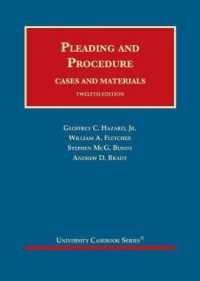Full Description
This volume represents a significant contribution to the fields of migration studies, postcolonial theory, and critical geography. It critically engages with the intersections of power, space, and identity to deepen our understanding of the challenges and possibilities of negotiating citizenship and belonging in an increasingly interconnected and precarious world. The book interrogates the construction of nationalist narratives and their role in perpetuating exclusionary paradigms, which marginalize certain demographic segments and reinforce hierarchical notions of belonging. Further, it examines the bio-political mechanisms that engender conditions of precarity, reshaping conceptions of citizenship and nationhood in response to environmental degradation, population control policies, and state surveillance. The essays in the volume delve into the diverse factors driving displacement, encompassing both state-driven policies of engineered displacement and environmental factors such as climate change, resource depletion, and natural disasters. They also focus on the marginalized spaces of displacement and explore how these sites become loci of resistance and incubators of alternative forms of belonging.
Interdisciplinary in its approach and rigorous in its empirical analysis, the volume will stimulate further research, provoke new questions, and inspire transformative interventions in the fields of migration and diaspora studies, literary and cultural studies, politics and political processes, and sustainability studies.
Contents
Introduction PART I: Migratory experiences and Mnemonic recollections: Displacement, Memory and Other Sites of Belonging 1. Memories of Migration: Retelling the Alternative History of Oraons/ Kurukhs Migration in North Bengal. 2. Let this be Our Tribute Paid to Memory: J.M.Coetzee's The Childhood of Jesus and the Possibility of Other Futures 3. Contextualizing Jibanananda's "I Shall Return to This Bengal" PART II: Of Heterotopia and Other Imaginary Communities: Alternative Nationalities and Identity Spaces 4. Reconfiguring Char as "Heterotopia": Poetics, Politics and Polemics of Miya Poetry in Assam. 5. Between Dreams and Despair: Experiencing Heterotopias in Rattan Lal Shant's "Moss Swimming on the Water". 6. A Man of No Nation, But a Bengalee: Reading Premendra Mitra's "Ghana-da" stories alongside Tagore's "Nationalism". PART III: Political Precarity and Lived Experiences of Displacement and Migratory Otherness 7. "Our lives have become weapons in a rugged political contest"—A Reading of Behrouz Boochani's No Friend But the Mountains and Dina Nayeri's The Ungrateful Refugee. 8. A Hunt for Liberty and License: Examining Abhishek Shah's Directorial Debut Hellaro. 9. Contested Heterotopias: Bombay and Manto's stories of the Migrant Undercity. 10. National Identity, Citizenship and the Refugee Crisis:A Study of Asif Currimbhoy's The Refugee. PART IV: Unmapped Terrains and Transitional Contours: Locating Displacement as Coming into Being 11. Politics of Permissibility: Exploring Ecocracy Within the Postcolonial Nation-State. 12. Lost In The Convolution Of Transnational Space: A Study With Special Reference To Bharati Mukherjee's Wife 13. The trauma and the triumph: The Case of the Nowhere People in Srijit Mukherjee's Rajkahini and Goutam Ghosh's Shankhachil. 14. Stateless in South Asia: Post-Partition institutional violence and the struggle for identity in Debesh Roy's Udbastu (Refugee).







